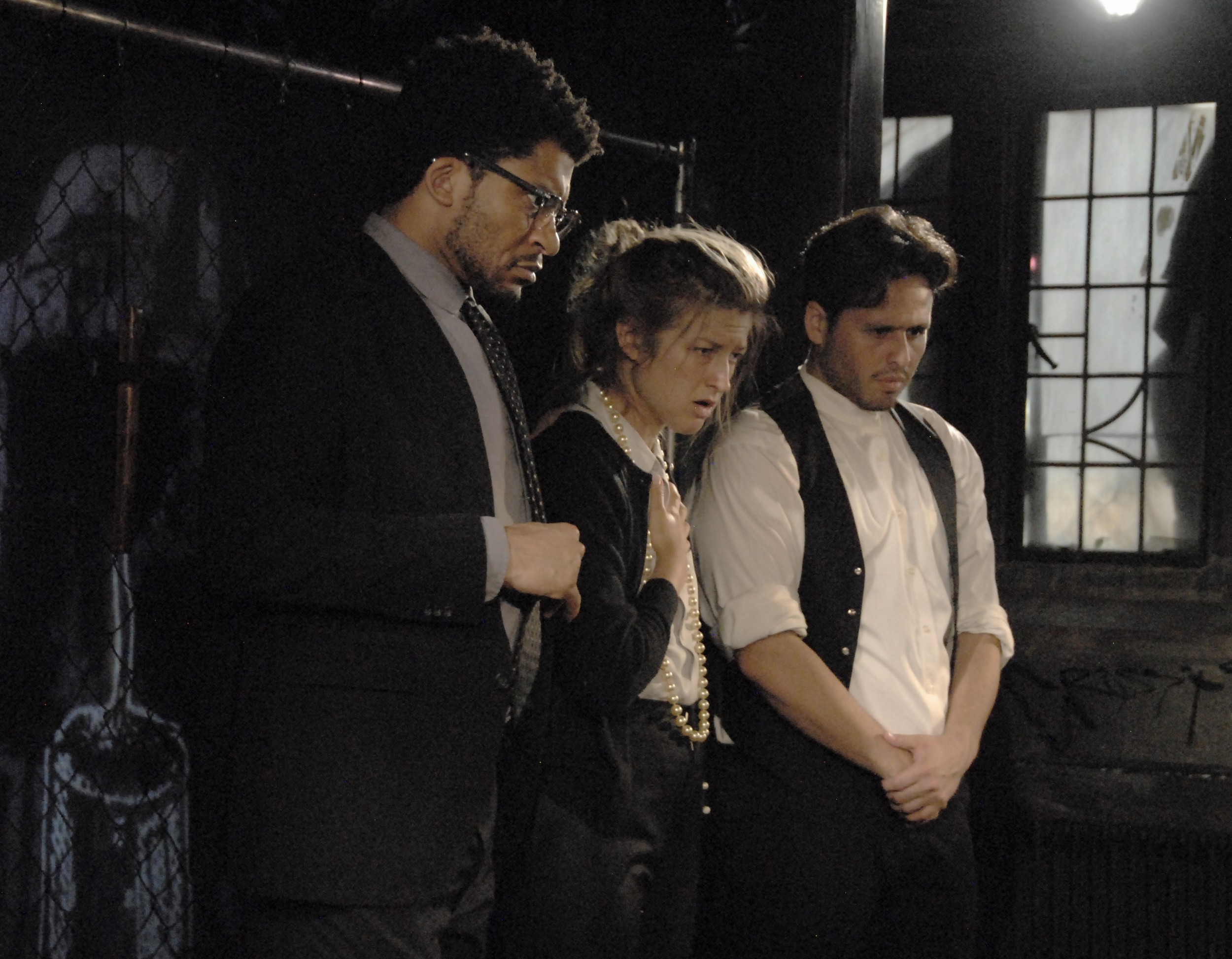Review of Débâcles, Yale Cabaret
Third-year Yale School of Drama director Elizabeth Dinkova has a penchant for wildly dark comedy and she may have found her most suitable match yet directing Marion Aubert’s Débâcles, now in its first-ever English language staging, as translated by Erik Butler and Kimberly Jannarone, at Yale Cabaret. The play sends up the French Resistance with the kind of no-holds-barred approach to comedy that might recall Terry Southern and Stanley Kubrick’s caustic satire of prospective world annihilation, Dr. Strangelove. And since Aubert writes in French, the play’s corrosive sense of humanity’s horrendous ability to live with the most appalling circumstances might well recall amusing misanthropes like Céline. It is humor not for the easily offended, and, since it takes to task the situation of occupied France in which, Aubert’s note tells us, only 2% of the population openly resisted the Nazis, it’s a timely enough tale of how folks will get along with anything, so long as there’s food and sex available. Trading one for the other is fairly standard wartime procedure and Aubert is relentless in depicting how dysfunctional all aspects of the world become during wartime.
Simon (Arturo Soria) (photo: Elli Green)
The play aims to affront and to entertain. It’s a neat trick when it does both at the same time. Begin with its hapless hero, Simon (Arturo Soria), a precocious teen who lends considerable credence to the view that only the French truly appreciate Jerry Lewis. Soria hits many of the notes of forthright naïveté that fueled many a Lewis comedic man-child, and almost everything he says is in excruciating—and thus ridiculous (or vice versa)—bad taste. Unlike Lewis’s characters though, Simon is not mawkish but rather a walking attack of hormonal urges. He lusts after everyone. In this he’s not alone, as we also have a matronly woman, Madame Lisa (Rory Pelsue), who is pretty much up for anything, a father, Paul (Matthew Conway), who has had sex with his daughter Camille (Anna Crivelli), and a casually rapacious Nazi SS officer Martynas (Josh Goulding) who rapes a waif Itto (Amandla Jahava) and pursues all he can get from Remy (Jakeem Powell), the father of Camille’s baby. Their homoerotic dalliance is a set-piece designed to signal the loathings and lusts that seem to fire the popular imagination's view of fascism.
Indeed, male sexuality, as more or less a constant state of rut, is figured somewhat talismanically by a photo of Remy’s “crown jewels,” and by an elusive figure called Handsome Blond (Jeremy O. Harris), a British airman who seems to be the ne plus ultra of desirability. Meanwhile, Simon, who, despite his teenage tendency to hyperventilate about everything that passes through his bedeviled brain, may have a heart, is harboring two Jews—or, as the play likes to stress, Jewesses—in his closet: the adventurous and probably romantically smitten Clara (Catherine Rodriguez) and her great-aunt Marie-Ange (Caitlin Crombleholme), who has had her tongue cut out by Nazis. There’s also Martin (Michael Costagliola), brother of Camille, who wants to ingratiate himself with Martynas, and Aurélie (Emily Reeder), mother of Camille and Martin, who opens the play in a state of hyper-hysteria that does much to set the tone. Later she sacrifices her hair for no very clear reason.
Marie-Ange (Caitlin Crumbleholme), Clara (Catherine Rodriguez) (photo: Elli Green)
Annie Dauber’s set makes use of five different playing spaces: Paul and Aurélie’s livingroom; Simon’s bedroom and closet; Madame Lisa’s kitchen; the meeting place of Remy and Martynas; and a raised stage area that is most often used as the banks of a river. There’s much turning this way and that to follow the action and also lively use of the Cab's open space, with much running about and, at one point, Simon crawling surreptitiously through the audience. Projections and subtitles flash to set up the different scenes. And don’t forget the inestimable Gavin Whitehead, dramaturg and percussionist, who adds many wonderful and important touches of apropos sound to the proceedings and who sits at the back of the playing space like a detached but responsive presence.
Madame Lisa (Rory Pelsue), Simon (Arturo Soria) (photo: Elli Green)
Highlights in performance, in addition to Arturo Soria’s overwhelming energy as Simon, are Josh Goulding’s charismatic nastiness as Martynas, Caitlin Crombleholme’s comically grotesque dumbshow as Marie-Ange, Amandla Jahava’s bouncy victim Itto, Rory Pelsue’s tense delivery of Madame Lisa’s erratic stream-of-consciousness (Pelsue notably delivers the masculine French names of characters correctly), and Jeremy O. Harris’ lampoon of a French accent.
Finally, the play’s conclusion features a powerful turn by Anna Crivelli as Camille, pushing baby Charlotte in a stroller, and moving through the ruins of the town while projections of bombs flank their path. Camille sings “The Partisan,” the song Aurélie sang to rock the baby (both Crivelli and Reeder have lovely voices), and the comic bathos of Camille’s asides join with the lyrical heroism of the song to create a telling mix of emotions that ends the play quite powerfully.
Débâcle, or what the author’s notes call “regrettable change,” is a word, in English, for an almost catastrophic failure, usually with piquant notes of good intentions gone awry. It’s the perfect word for what a wartime world puts its people through, and it becomes particularly relevant when they try to think of a future beyond the horrors of their present. We are that future, Aubert knows, mired in our own débâcles.
Débâcles
By Marion Aubert
Translated by Erik Butler, Kimberly Jannarone
Directed by Elizabeth Dinkova
Dramaturg, percussionist: Gavin Whitehead; Set & Costume Designer: Annie Dauber; Assistant Set & Costume Designer: Matthew Malone; Lighting Designer: Krista Smith; Sound Designer: Frederick Kennedy; Technical Director: Lydia Pustell; Associate Technical Director: Rae Powell; Stage Manager: Alexandra Cadena; Producer: Flo Low
Cast: Matthew Conway; Michael Costagliola; Anna Crivelli; Caitlin Crumbleholme; Josh Goulding; Jeremy O. Harris; Amandla Jahava; Rory Pelsue; Jakeem Powell; Catherine Rodriguez; Emily Reeder; Arturo Soria
Yale Cabaret
February 16-18, 2017












